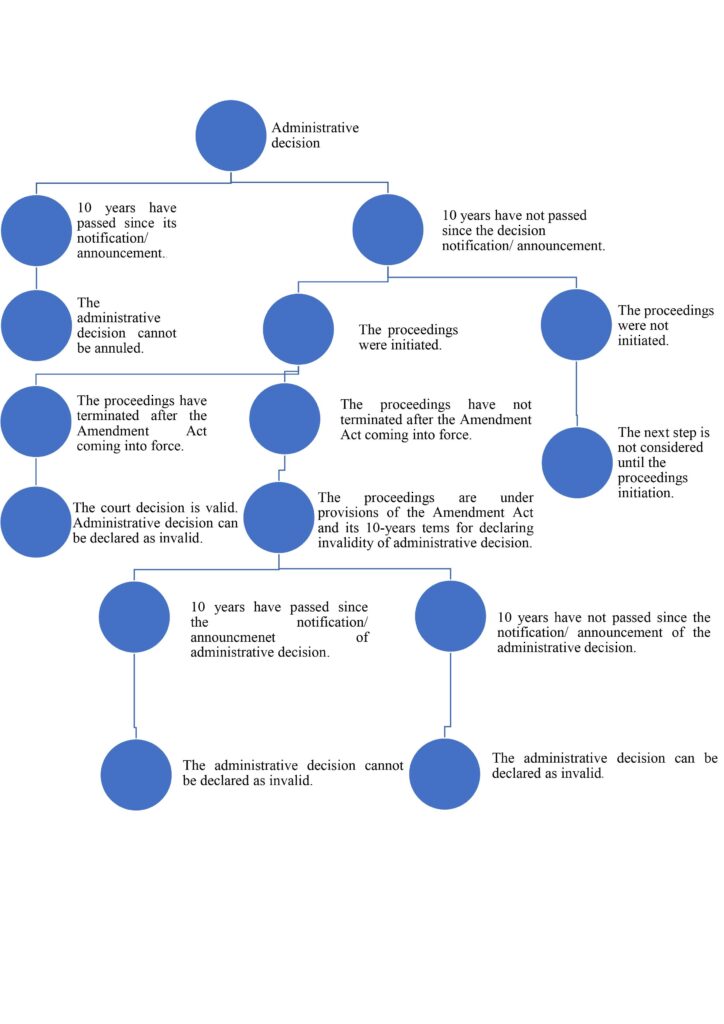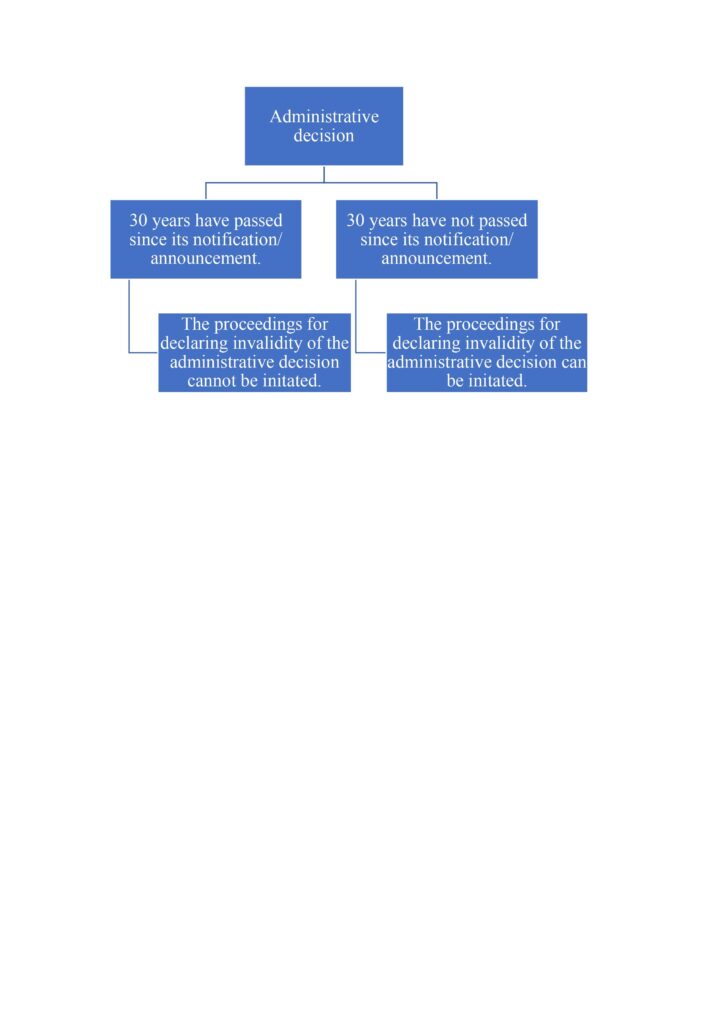THE POLISH ADMINISTRATIVE PROCEDURE CODE AMENDMENT IMPORTANT FROM THE PERSPECTIVE OF POST-WAR POLISH PROPERTIES LEGAL STATUS AND POLISH OWNERS OF JEWISH ORIGIN

On 11 August 2021 the Polish Act of Administrative Procedure Code Amendment was passed by the Polish lower house of the Parliament after the Senate’s adjustment consideration. On 14 August 2021 the Amendment Act was signed by the Polish president and on 16 August 2021 was published in the Polish Official Journal of Laws. As we can read on the official websites and from the official Ministry of Justice statement (from the ministerial conference):
The amendment to the Polish Administrative Procedure Code protects the interests of thousands of Polish citizens who are uncertain about the fate of properties important to them. The provisions passed by the Sejm dismiss the spectre of never-ending claims against the State Treasury. [1]
This statement should be read in the context of the real estate’s reprivatization socio-legal problem, to which politicians have mainly referred. [2]
It is worth to notice that this amendment implemented Constitutional Tribunal judgement of 2015 (P 46/13) on the inconsistency with the Polish Constitution of previous procedural articles and there are a lot of critical voices about recent amendment, for instance here:
To see the Constitutional Tribunal judgement: https://sip.lex.pl/#/jurisprudence/521776428.
THE AMENDMENT ACT PROVISIONS
- The amendment substantiation
As we can read in the explanatory statement of this act (available here: https://orka.sejm.gov.pl/Druki9ka.nsf/0/BCF5DD9FF9CEF7DFC12586B7003640D8/%24File/1090.pdf) the proposed law aims to adapt the legal system to the judgment of the Constitutional Tribunal of 12 May 2015 declaring Article 156(2) of the Administrative Procedure Code unconstitutional. [3] Thus it is a main reason of this amendment. As legislative commission emphasized: it should be noted that the legislator has been left with a rather large margin of freedom of legal instruments for the implementation of the constitutional values indicated by the Polish Constitutional Tribunal. [4] This is the reason why the article 156 of the Administrative Procedural Code in form of the proceedings limitation periods was proposed to amend.
To see the entire legislation path: https://www.sejm.gov.pl/Sejm9.nsf/PrzebiegProc.xsp?nr=1090 with the act draft (parliamentary printed matter no. 1090).
- Enacted provisions
To see the Amendment Act: http://orka.sejm.gov.pl/opinie9.nsf/nazwa/1090_u/$file/1090_u.pdf
- An administrative decision may not be declared invalid if 10 years have passed since notification or announcement of the administrative decision and if it produced irreversible legal effects. (article 1 point 1 amending article 156 section 2 of Polish Administrative Procedure).
- Proceedings for the declaration of invalidity of the administrative decision may not be initiated if more than 30 years have passed since the decision notification or announcement date (article 1 point 2 amending article 158 section 3 of Polish Administrative Procedure).
- The provisions of this Act are applicable to administrative proceedings in case of declaring an administrative decision invalid that were initiated and not concluded before the entry into force of this Act (article 2 section 1).
- Administrative proceedings to declare a decision invalid, which were initiated more than 30 years after the date of notification or announcement of such decision and have not been completed before the entry into force of this Act, shall be discontinued ex lege.
- Legal effects
- The exclusion of the possibility to declare the invalidity of the decision issued 10 years back in all cases.
- The amended provision will be governed to the administrative proceedings of declaring invalidity of the decision if the proceedings were commenced and not concluded before the date of entry into force of the amendment.
- Administrative proceedings of declaring invalidity of the decision, commenced after the expiry of 30 years from the date of notification or announcement of the decision and not concluded by the date of entry into force of the amendment with a final decision, will be discontinued ex lege.
- The amendment will affect not only the reprivatization proceedings but also a number of other issues in administrative proceedings, e.g. retirement proceedings, disability degree certificate proceedings, etc.
About other legal effects see this more detailed analysis: https://www.prawo.pl/samorzad/niewaznosc-decyzji-administracyjnych-niebezpieczna-nowelizacja,510006.html.
For better understanding we present to you simplified graphs of legal effects which are the implications of this law change in a form of decision tree:

CONTROVERSIES AND NEGATIVE ASSESSMENT BY THE LEGAL COMMUNITY
As it is emphasized by the Polish legal community, this amendment act is based on the false assumptions and legal presuppositions.
- It is not true that this amendment does not bloc the civil procedure initiation to get a compensation, because to initiate a civil compensation proceedings it is required to receive a prejudication in form of the administrative decision. The amendment act closes possibility to obtain the latter.
- The main goal of the Amendment Act is not to stop an abused reprivatization, because this issue represents only a small percentage of all reprivatization cases. Therefore, this amendment is the inadequate legal remedy for this problem and as a consequence it harms the rest of the proceedings.
- It is not true that the amendment concerns the property without inheritance, because the provisions concerning inheritance are not being amended. These issues are regulated by the provisions of Civil Code, not by the Administrative Procedure Code.
To see more information in Q&A form: https://serwisy.gazetaprawna.pl/samorzad/artykuly/8199894,nowelizacja-kpa-reprywatyzacja.html
To see detailed and large explication of the legal problems with Amendment Act: https://serwisy.gazetaprawna.pl/orzeczenia/artykuly/8227293,kpa-kodeks-postepowania-administracyjnego-reprywatyzacja-majatek.html
DIPLOMATIC AND POLITICAL CONSEQUENCES
At the end it is worthy do add that this decision of passing this Act has had Polish-Israeli diplomatic implications (on the Warsaw- Tel Aviv line). This is because the changes in the administrative procedure are significant for the Jewish community in Poland and in the world, in situations where the Jewish ancestors and relatives lost their property/ assets during the World War II and after that during the communist’s regime times in Poland due to private property’s nationalization (e.g. Bierut’s decree on Warsaw lands nationalization). The Amendment Act closes a legal path to get back these real estates.
The Israel’s government has lobbied American diplomats to react decisively on this issue. Ultimately the chief of the American diplomacy Antony Blinken made a statement and expressed his “deep regret” on these legal consequences.
About this diplomatic issue see:
Leaving aside diplomatic and international issues, the Polish Administrative Procedure Code Amendment has aroused both approval and a host of criticisms. The approval comes from the socio-environmental and urban society which finds this amendment as the end of the abused reprivatization (see: https://www.gazetaprawna.pl/wiadomosci/kraj/artykuly/8226599,jan-spiewak-nowela-kpa.html). The critique came, on the other hand, from the legal society side, which finds this amendment an inaccurate legal measure for this problem, because changed laws strike also other administrative proceedings which are consistent with law.
As could be expected, the governmental side views this change very positively as we could see from the already mentioned conference of the Ministry of Justice and the statements of the Prime Minister and the President (see also: https://www.gazetaprawna.pl/wiadomosci/kraj/artykuly/8226742,morawiecki-nowelizacja-kpa-naduzycia.html).
[1] https://www.gov.pl/web/sprawiedliwosc/nowelizacja-kodeksu-postepowania-administracyjnego-chroni-interes-tysiecy-polakow, (access date: 17th August, 2021).
[2] For example see the statement of polish president arguing his signing- https://www.prawo.pl/samorzad/nowelizacja-kpa-dotyczaca-mozliwosci-kwestionowania-waznosci,510045.html, (access date 17th August, 2021).
[3] https://orka.sejm.gov.pl/Druki9ka.nsf/0/BCF5DD9FF9CEF7DFC12586B7003640D8/%24File/1090.pdf, (access date: 17th August, 2021).
[4] Op.cit.

